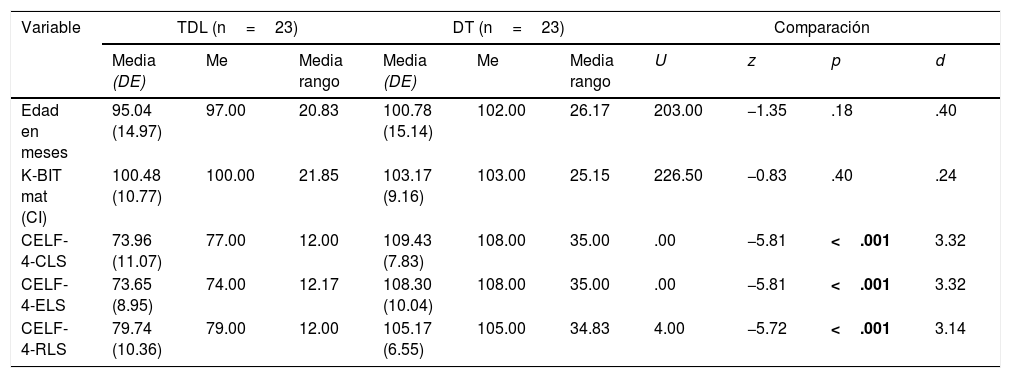Cada vez hay más investigaciones que tratan de encontrar posibles identificadores tempranos de las dificultades del lenguaje. El objetivo de este estudio fue analizar los antecedentes familiares de trastornos del lenguaje u otros trastornos del neurodesarrollo, los factores sociodemográficos y otros indicadores de desarrollo a partir de informes parentales en niños con y sin diagnóstico de trastorno del desarrollo del lenguaje. Además, se analizó el grado de acuerdo entre la percepción de dificultades lingüísticas reportadas por las familias (madres/padres) y el nivel obtenido en la evaluación estructurada.
MétodoParticiparon 23 niños y niñas con trastorno del desarrollo del lenguaje y otros 23 con desarrollo típico, de entre 5 y 9 años, bilingües del catalán y español, emparejados por edad y sexo. Se utilizó la prueba CELF-4 para realizar la evaluación y el diagnóstico y test estandarizados para medir el nivel intelectual y el vocabulario expresivo y receptivo. Se administró un cuestionario parental para medir las variables: antecedentes familiares, factores sociodemográficos, indicadores de desarrollo y percepción de las dificultades lingüísticas de sus hijos.
ResultadosSe observó un mayor porcentaje de antecedentes familiares en el grupo con trastorno del desarrollo del lenguaje que en el grupo con desarrollo típico. Se encontró una relación entre el nivel económico y el hecho de presentar TDL, un efecto significativo de grupo para el nivel económico en relación con el vocabulario receptivo y una correlación significativa entre primeras palabras con el vocabulario expresivo y receptivo posterior. Se encontró acuerdo entre el informe parental y la evaluación estructurada, aunque solo en las dificultades más notorias.
ConclusionesDiferentes variables sociodemográficas y la edad de adquisición de las primeras palabras están relacionadas con el nivel de desarrollo del vocabulario posterior.
There is a growing body of research seeking to find early identifiers of language difficulties. The aim of this study was to analyze family history of language disorders or other neurodevelopmental disorders, sociodemographic factors and other indicators of development from parental reports in order to distinguish between children with and without developmental language disorder. In addition, the degree of agreement between the perception of language difficulties reported by parents and the children's assessment scores was compared.
Method23 Catalan-Spanish bilingual children with developmental language disorder and 23 typical development children, matched by age and sex from 5 to 9 years of age took part in the study. CELF-4 was used to perform the language assessment and diagnosis, as well as other standardized tests to measure non-verbal intellectual level and expressive and receptive vocabulary. A questionnaire was administered to parents to measure the following variables: family history of language and other difficulties, sociodemographic factors, developmental indicators and their own perception of their children's language difficulties.
ResultsA higher percentage of family history of language and other difficulties was observed in the developmental language disorder group compared to the typical development group. The economic level and the presence of DLD were significantly related, and we also found an effect of group on the economic level and on receptive vocabulary. A significant correlation was also found between the first words and later receptive vocabulary. Parental perception of their children's language difficulties and the results of the standardized language evaluation were also correlated, although only in the most evident difficulties.
ConclusionsDifferent sociodemographic variables and the age of acquisition of first words are related to the development of subsequent vocabulary.













